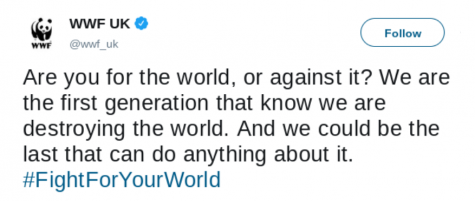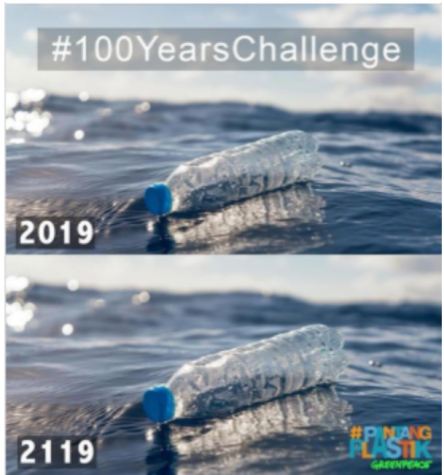#10YearChallenge: Climate Change Edition
February 15, 2019
The 10-year Challenge is an internet meme sensation, like today’s World Famous Egg, that recently struck mainstream media. It was initially created to showcase one’s glow-up by simply comparing photos from 2009 and 2019, but environmentalists pulled its focus to highlight drastic environmental changes due to climate change.
Senior Bella Alexandre reacts to the environmental 10 year challenges, saying, “most of them are pretty bad, and it’s really sad to see how the planet has changed in only 10 years.”
Moreover, this fad aided environmentalists around the world by spreading awareness about the effects of human interference on the climate and geographic structures. Instead of posting their own selfies, media activists posted memes depicting starving polar bears, disappearing ice caps, deforestation and polluted oceans in an attempt to open the eyes of all users.
Redirecting the amusing viral fad, associations like the World Wildlife UK Association used it to create campaigns against food industries and plastic usage in order to encourage radical change.
The organization tweeted, “Are you for the world, or against it? We are the first generation that know we are destroying the world. And we could be the last that can do anything about it. #FightForYourWorld.”
Last month, Business Insider offered a convenient glimpse into the many environmental posts that have been circulating the media. The images have highlighted the truly shocking visual differences in forests impacted by deforestation.
However, these tweets tend to not suggest areas in which an individual consumer is able to create change — lessening their contribution to human’s carbon footprint.
Understanding the effects of consumerism
The meat industry has been an infamous contributor to greenhouse gas emissions for years. According to The New York Times, “worldwide, livestock accounts for between 14.5 percent and 18 percent of human-induced greenhouse gas emissions.” As consumers of meat, we are supporting the greenhouse gas emissions of the industry.
“Even though I love meat, I fully believe the meat industry is unethical and problematic,” senior Triana Callam says.
However, resistance to carnivorous habits can be challenging. Celebrities are constantly endorsing health recommendations, such the keto or paleo diet, both of which are very meat-centric. Not only that, but living a meat-free lifestyle can come at harrowing costs, especially due to the fact that meat is so widely accessible and inexpensive.
According to the USDA, food deserts are parts of the country that don’t have access to fresh fruit, vegetables and other healthful whole foods, which are usually located in impoverished areas. The lack of grocery stores, farmers’ markets, and healthy food providers, causes unhealthy options to be more accessible than healthy options. These communities can be targeted with fast-food restaurants like McDonalds and Burger King because of the affordability.
“The decision to be a vegetarian is not one that everyone can afford because of the price difference between fast food meals and grocery store runs. That being said, these communities, primarily communities of color, are also usually the target of environmental injustice and food deserts,” senior Phoebe Liccardo says. “These food deserts allow very few healthy options for people at or below the poverty line and create a positive feedback loop for the supply and demand of unhealthy, cheap meals filled with meat.”
Solely acknowledging the meat industries’ contributions to climate change doesn’t result in a betterment of the industry nor environment without action. Research gathered from The Oxford Martin School declares that “a widespread switch to vegetarianism would cut emissions by nearly two-thirds.”
Within our school, people are starting to move towards more plant-based diets. While global adoption of vegetarianism seems unattainable, it may just be a vital contributing factor to end global warming.
“I think [vegetarianism] is great! Even though I do eat meat, I realize that going vegetarian would help reduce waste and promote healthier living,” senior Audrey Freeman says.
Starting this 2018-19 school year, ETHS has been taking part in Meatless Mondays. Our schools cafeterias have been serving meatless dishes to all students and staff. ETHS, along with other Evanston/Skokie schools. In fact, ETHS Director of Nutrition Services, Kim Minestra, points to an essential benefit that lessening our meat consumption by as little as once a week can have significant impacts on our carbon footprint.
Gedion Yitref, chemistry teacher, says, “I take part in Meatless Mondays and I think it’s a good cause. We all have to do our part to contribute to an overall reduction in global warming.”
Greenpeace is a global organization dedicated to educating individuals on the environment and promoting change. A translated tweet from their Indonesia unit reads, “yesterday, who joined #10yearschallenge? Hmmmm, what about the #100yearschallenge? Approximately what plastic bottles do you use today, and what will they be like 100 years from now? Apparently, the shape and condition are still the same, still floating in the ocean… It’s time for us to get rid of disposable plastic, because these bottles won’t break down in hundreds of years. Bring your tumbler everywhere!”
In relation to this, some ETHS students bring a reusable water bottle from home everyday to their classes, rather than single-use plastic ones.
“They are completely wasteful if not recyclable, and degrading our environment past the point of no return,” Liccardo says.
National Geographic proclaims that plastic takes over 400 years to degrade, mainly residing in our oceans, landfills and parks.
Despite this, plastic has been increasing in popularity since the 50s. Plastic is the most produced man-made material, and production doubles every 15 years. However, implementing less plastic into your life is crucial to a stable climate. There are steps each and every individual should be attempting to reach that goal.
“I always carry a reusable water bottle, and I try my best to shop sustainably in terms of what I eat and material wise. Or, I just turn down plastic bags and straws while buying something; those are some smaller ways,” senior Caelen Behm says.
The clothing industry is in part responsible for shifts in climate as well, producing “5 percent of global greenhouse emissions,” according to Nate Aden, a senior fellow at the World Resources Institute.
The consumerism of fashion — especially “fast fashion” — has rapidly increased recently. Rising demands for new trends and styles provoke shorter timeframes for clothing production, resulting in copious amounts of waste. Since 2000, the World Resources Institute found that consumers are purchasing 60 percent more from the retail industry. Because of the low prices of “fast fashion,” [stores like Forever 21, Romwe, and Zaful] consumerism is at an all time high, satisfying the ever present demand for affordability.
Textile production is easily one of the most polluting markets, generating 1.2 billion tons of carbon each year, according to the Ellen MacArthur Foundation.
The disposal of clothing is an entirely new issue, as “…almost 60 percent of all clothing produced is disposed of within a year of production (ending in landfill or incineration)” as reported by McKinsey & Company.
Donating old articles of clothing can be a way to support fast fashion products by cleaning out your closet to make room for new articles of clothing. Yet, donating can, additionally, help the environment because it provides more clothing options for those who decide to not buy into fast fashion retail. Also, if the donated clothes are reused, it is a better alternative to a landfill.
Sophomore, Eloisa Tirres, contributes to one of Evanston’s second hand stores, Crossroads. “I always choose to donate my clothing to Crossroads, because they’ll give you store credit. It’s one way to make sure that I have a positive impact on my environment by not being wasteful of the resources I have.”
Every person is bound to face the effects of climate change at least once in their lifetime. Sophomore Mia Houseworth, Green Team leader, doesn’t think this is unnoticeable.
Conclusion
“Everyone is affected by climate change. We have less than 12 years to reverse climate change, according to the UN, and the United States must take action. There are major fluctuations in the temperature that affect all of us daily, and it will only continue to get worse for the generations to come if it isn’t dealt with now,” Houseworth says.
All in all, the use of social media outlets to advocate for prevalent environmental issues isn’t enough. It’s easy to establish blame towards one market or industry, but in reality, most everyone is accountable for the environmental decline. Efforts to reduce the consumption of meat, plastic, and clothing are essential to a clean planet and a healthier future for all its inhabitants.










